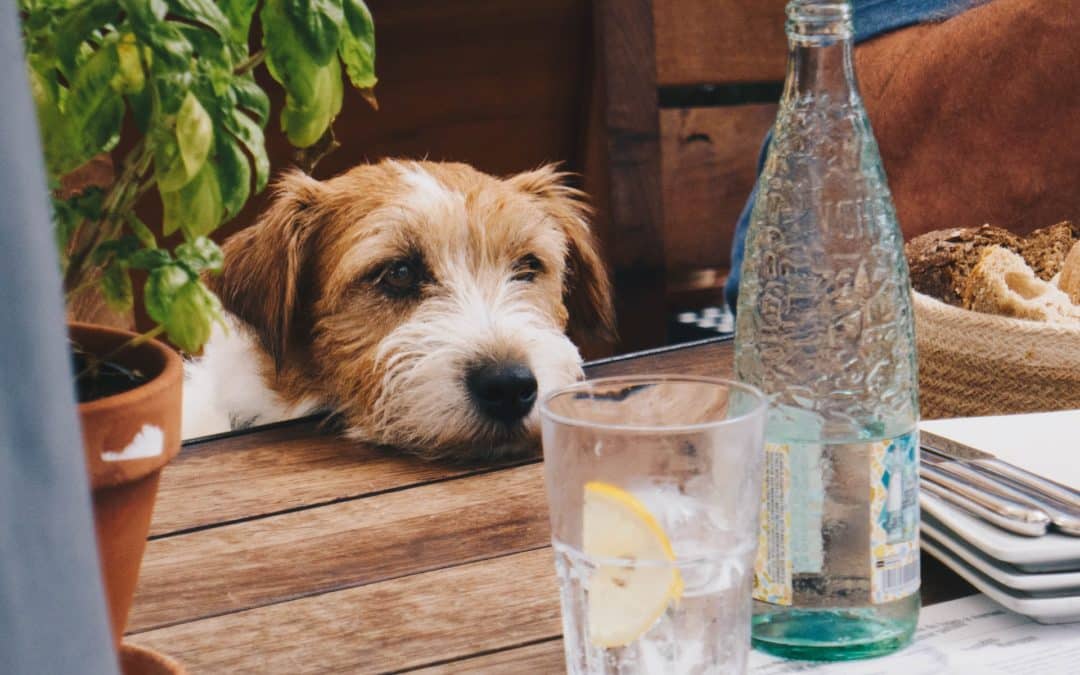Dogs are experts when it comes to begging. That darling head in your lap, the puppy-dog eyes that say, “I feel like I’ve never eaten in my whole life, even though you just fed me twenty minutes ago.” It can be hard to resist giving your dog that little bit of egg, steak, or pizza crust.
“What could it hurt?” you say, handing it down to them. “It’s only one piece…” But more often than not, one piece becomes two, then three, then four. Before you know it, your dog is in trouble. Here’s why table food is bad for dogs.
Why Table Scraps Are Dangerous
There are plenty of reasons to avoid table scraps! Table food can be very dangerous and even deadly—some foods are poisonous to dogs, while others can cause allergies, injuries, broken teeth, obesity, and even behavioral problems.
Some Foods Are Unsafe for Dogs
While there are many foods that dogs and humans can share, there are also some that are safe for you but could be lethal for your dog. It is always important to check the ingredients before you feed anything to your pet. Here are some examples of unsafe foods, and the damage they can cause.
- Grapes and Raisins – Cause kidney failure and liver damage
- Onion Family (including garlic) – Causes gastrointestinal irritation and red blood cell damage
- Corn on the Cob – Although the corn kernels are digestible, the cob can cause blockages if swallowed
- Avocado – Causes vomiting and diarrhea
- Bones and Antlers – Bones can splinter and cause choking as well as perforations in the stomach or intestines; they can also damage teeth
- Chocolate – causes kidney failure
- Xylitol (found in toothpaste and sugarless gum) – can be fatal as it lowers their blood sugars to dangerously low values
Behavioral Problems Associated with Table Scraps
Dogs who are often fed from the table might start to exhibit some bad behavior. The most common one is stealing food from the table whenever the humans walk away. Other times, table-fed dogs might snatch food from people’s hands, which could frighten some people or lead to accidental bites.
Diseases Common in Table-Fed Dogs
Obesity
Dogs that eat a lot of table scraps are also often overweight, which affects their general health. Dogs who are packing a few too many pounds become susceptible to joint pains, diabetes, osteoarthritis, kidney disease, and heart disease.
Pancreatitis
Caused by eating fatty foods, pancreatitis can be fatal to dogs but is also extremely uncomfortable. When the pancreas releases its enzymes too early, they start breaking down tissues in the pancreas and other organs.
How to Stop Your Dog’s Table Scrap Habit
For most people, getting their dog to stop eating table scraps requires a few minor lifestyle changes. It might mean moving your plate to the dining table instead of the coffee table, so it is a little further away from hungry snoots. It might mean starting some new behavior training, or just hardening yourself to the very cute faces your dog makes when they beg.
Here are some ideas on how to help you prevent your dog from eating table scraps:
- Teach your dog the “leave it” command—this will enable you to pick up dropped food that they should not eat.
- Spend your mealtimes in separate rooms.
- Only feed your dog food in their own bowl, so they are not tempted to take yours from the table or your hand.
- Try additions to their kibble to give your dog more variety in their meals. Additives like chicken or treats can be mixed into their kibble to give your dog reasons to be excited for meal time, and less likely to want your meals.
Exceptional Dietary Care for Dogs in Gilbert, Arizona
Choosing the right diet for your dog—and one that they actually like—can be a challenge. If you are working to keep your dog as healthy as possible, you are doing the right thing by your furry friend. The team at East Valley Animal Hospital can help you keep your dog healthy for years to come with our wellness checkups and dietary advice. Give us a call to schedule an appointment today.
Images used under creative commons license – commercial use (9/22/22). Photo by Daniel Brunsteiner on Unsplash.

